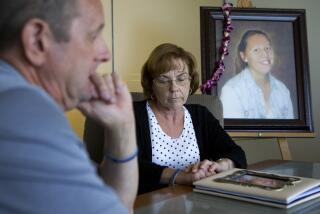Police Not Required to Share ‘Angel of Death’ Files
- Share via
BURBANK — A judge on Friday refused to force Glendale police to reveal investigative reports in the “Angel of Death” case, but said police must be ready by October to disclose more information.
Former respiratory therapist Efren Saldivar has sought to subpoena the investigative files in connection with his defense in a civil suit. Saldivar was fired from Glendale Adventist Medical Center after the alleged mercy killings of patients from 1989 to 1997, but he has not been charged with any crime.
Glendale police can keep the files under wraps for now, but “I’m not going to go on indefinitely,” said Superior Court Judge Carl J. West.
“I understand this is an active criminal investigation, but at some point that becomes outweighed by the court and the interests of the parties,” he said.
The judge set a hearing for Oct. 20 to discuss more evidence issues and said the police, who have revealed very little about the case, should be prepared to provide “a definitive timetable” for completing the investigation.
“Let’s face it, either you have something or you don’t,” said Terry M. Goldberg, Saldivar’s lawyer. “If the police had anything, they would have charged him by now, and not letting us see the evidence is just an effort to drag this out.”
The ruling Friday was the latest twist in a mysterious case that began in March 1998 when Saldivar allegedly confessed to killing as many as 50 patients under his care at Glendale Adventist. Although he has not been charged with any crime, he is being sued by several families who claim he poisoned their loved ones in the hospital.
In trying to defend himself in the civil wrongful-death suits, the 30-year-old Saldivar has requested that the police allow him to see the evidence they have gathered. Saldivar’s lawyer has explicitly pressed for copies of the alleged confession--which he says was coerced and false--and medical reports from 20 exhumed corpses. Saldivar later recanted his confession, saying he was depressed at the time and made everything up.
The hearing Friday in Burbank Superior Court was triggered by a wrongful-death suit filed by the family of John N. Schwartz, a 91-year-old Glendale man who died at Adventist in 1993. The family contends Saldivar may have poisoned Schwartz with heavy doses of muscle relaxants.
*
Saldivar’s lawyer, however, has argued that Schwartz died of natural causes after a hip replacement. And in a clash between the civil wrongful-death suit and the top-secret criminal investigation, Saldivar’s lawyer subpoenaed Schwartz’s toxicology report and demanded to depose a top Glendale detective.
Glendale Assistant City Atty. Carmen Merino blocked those requests and said Friday in court that the criminal investigation would be compromised if police were forced to reveal evidence in Schwartz’s case.
“As the court knows, this is a high-profile murder investigation and we are not prepared to share discovery at this time,” Merino said.
Lawyers for the Schwartz family sided with police, saying they didn’t want to rush the investigation and didn’t mind if the evidence continued to remain secret. Glendale police officials have refused to comment on the case.
After the 15-minute hearing, Saldivar’s lawyer stood on the courthouse steps and told a crush of news cameras that his client is innocent.
“Efren is a very emotionally distraught individual over this,” Goldberg said. “He didn’t kill anybody.”
*
Police have said that in a March 11, 1998 interrogation, Saldivar confessed to causing between 40 and 50 deaths at Adventist Medical Center. An anonymous tip had led police to Saldivar. He was arrested the day of the interrogation, but released two days later because police said they could not corroborate his story.
Since then, a special Glendale police task force has been searching for evidence and analyzing 20 exhumed corpses for traces of muscle relaxants that Saldivar allegedly used. The cost of the investigation is expected to run past $500,000, not including salaries, and the complexity of the forensics is one reason why the case is taking so long to resolve, authorities said.
More to Read
Sign up for Essential California
The most important California stories and recommendations in your inbox every morning.
You may occasionally receive promotional content from the Los Angeles Times.













